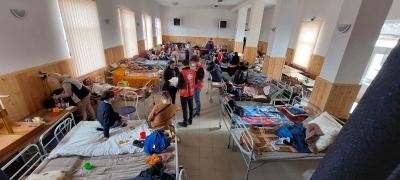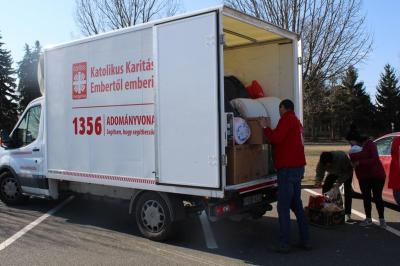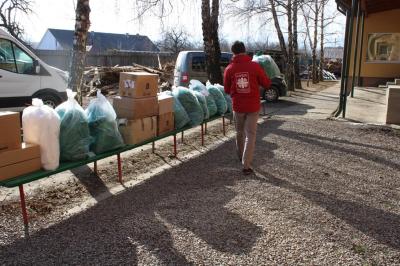Caritas Hungary have been working from the very first time with refugees, together with the Nyíregyházi Diocesan Caritas and the Debrecen-Nyíregyháza Diocesan Caritas. We provide service at the Barabás-Mezőkaszony (Косонь) border crossing point. We have a Caritas Base located next to the temporary warming place. Ukrainian and Ukranian-Hungarian people come here from the border station. They can relax in a warm place until acquaintances come for them or they get to a reception station - from where they are directed to accommodations. Ukrainian mothers and grandmothers with lots of children come to us, also there are a lot of African and Indian undergraduate students, whose transit we must assist. We try to cater for the newcomers (water, sandwiches, tea, etc). We will also transport them to the requested places: railway stations, larger settlements. Some of them need rest, they can sleep, they can get food and logistic help at the Caritas Base. We also try to reach their relatives, who stayed in Ukraine.
People come from the border in waves, there are at least 100 people in every two hours. We play with the kids, the little ones might not even understand the reason for the trip, as if they were going somewhere. On the first two days we had cca 5,000 refugees at the base. We also have a priest here, who can help people and staff mentally as well. Caritas Base works with 13-15 colleagues and many volunteers.

On 27-28 February, the Caritas Hungary delegation visited Ukraine, to assess the situation in Transcarpathia. We arrived on Sunday morning to support the Hungarian settlements in Transcarpathia. Caritas Hungary’s Medical Mission has been working here for almost five years, so we know very well the everyday life of the people living here. Internal refugees are also coming here. There is a quota on the number of refugees a municipality must accept. The minimum is fifty, the maximum is 1,700 people. The refugees come to Transcarpathia from the Donets Basin and Kiev. When we arrived, we got as far as the easternmost point, Kőrösmező (Ясіня). We also were in Rahó (Рахів), Aknaszlatina (Солотвино), Visk (Вишково), Nagyszőlős (Виноградів), Nagybocskó (Великий Бичків), Huszt (Хуст) and Técső (Тячів). We brought a lot of donations: mattresses, blankets, bandages, towels, all the things that are needed to accomodate the refugees. Our next shipment will most certainly be durable food, which will be very much needed in the near future. The financial situation is very difficult and now they have to take in internal refugees. Sometimes they do not even have enough to eat themselves, yet they welcome with warm hearts and open arms the Ukrainian-speaking people from Kiev, mainly of Ukrainian nationality. Meanwhile, Transcarpathian Hungarians are not spared by the mobilisation of all men between the ages of eighteen and sixty to join the army. So the families here are in a particularly difficult situation. Some of the refugees want to return to Kiev or the eastern Donetsk basin later, while others want to stay here permanently, to find housing and work in the settlements of the Hungarian community in Transcarpathia.
The front is getting very close, and there is a chance of fighting here too. At the moment, however, people are more worried that the shelves in the shops will be empty. Already, supplies are getting tight and there will simply be nothing for people to eat.

The majority say they do not want to leave, that they have created their modest living conditions here, and that they would like to stay if possible. We support them in this as much as possible. They have their homeland here, they still speak Hungarian, everything binds them here. Those who have connections in Hungary, or their children live elsewhere and have asked their parents to follow them have already left. However, this is only a small group of people, only a few houses have been vacated, and the neighbours are looking after them.

We learned from the people that the Ukrainian state does not pay their pensions, which are used for military purposes. They have been receiving a very modest pension, the equivalent of 25,000 forints, but now even this will not be credited to their accounts. The Ukrainian currency, the hryvnia, has plummeted from 11 forints two weeks ago to 0.9 forints today. This is also due to the war situation. There is a very high price increase, the shelves in the shops are no longer stocked to save up, so that people do not buy everything at once, and the quantitative quota has been in place for a long time. Some people get their bread by knowing the shopkeeper, who puts it aside for them, otherwise they wouldn't have access to it if they were queuing. The war is going on in Transcarpathia, even though armed fighting is not taking place there at the moment.
We would like to bring in large quantities of durable food. We are preparing for a very long presence. There is also the imminence of a humanitarian disaster in the part of Transcarpathia close to the Hungarian border.
Photos: Caritas Hungary
